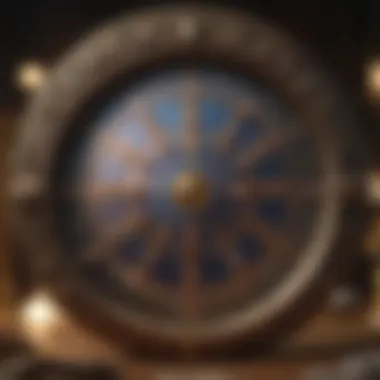Essential Methods to Accurately Determine Your Birth Time


Intro
Understanding one's birth time is not merely a trivial pursuit; it holds significant weight in the realm of astrology. The precise moment you enter the world can shape your astrological profile, influencing everything from your personality traits to life challenges. This guide focuses on practical methodologies to unearth your exact birth time. By utilizing various sources and techniques, you can enhance your astrological readings and gain deeper insights into your life's path and personal characteristics.
Zodiac Profiles
Overview of Each Sign
The zodiac is divided into twelve signs, each representing a segment of the celestial sphere. Each sign carries distinct energies and influences that contribute to a person's astrological identity. While the sun sign is widely recognized, the ascendant or rising sign—which is determined by your exact birth time—offers a more nuanced perspective of one’s individuality. To illustrate:
- Aries (March 21 - April 19)
- Taurus (April 20 - May 20)
- Gemini (May 21 - June 20)
- Cancer (June 21 - July 22)
- Leo (July 23 - August 22)
- Virgo (August 23 - September 22)
- Libra (September 23 - October 22)
- Scorpio (October 23 - November 21)
- Sagittarius (November 22 - December 21)
- Capricorn (December 22 - January 19)
- Aquarius (January 20 - February 18)
- Pisces (February 19 - March 20)
Personality Traits
Each zodiac sign embodies unique personality traits. For instance, Aries often exemplifies leadership and enthusiasm, whereas Pisces may present more sensitivity and creativity. An accurate birth time refines these traits as the ascendant sign can influence how individuals interact with the world. Knowing aspects of these traits helps in self-discovery and understanding interpersonal dynamics.
Strengths and Weaknesses
Understanding the strengths and weaknesses associated with each sign is imperative for personal growth. Here’s a brief overview:
- Strengths: Unique talents, abilities, and characteristics of each sign that foster success.
- Weaknesses: Challenges and vulnerabilities that may hinder progress.
A robust grasp of these aspects will enhance your relationship with yourself and others.
Compatibility Insights
Love and Relationships
Compatibility in astrology often hinges on more than just sun signs. Birth time provides insights into emotional responses and compatibility dynamics. For instance, knowing your ascendant can guide you toward more harmonious romantic connections by identifying shared values and life goals.
Friendship Compatibility
Friendships can also be evaluated through astrological lenses. Certain signs may provide complementary energies that create supportive bonds. Recognizing these relationships through your birth time can nurture enduring connections.
Workplace Dynamics
Astrology has practical applications even in professional settings. Understanding colleagues' signs can help navigate workplace relationships and dynamics more effectively. Knowing strengths and weaknesses ascribed to each sign can facilitate collaborative efforts.
Astrological Events
Monthly/Weekly Horoscope Breakdown
Astrological events occur regularly, influencing the energies of the universe. Each month brings unique horoscopes based on celestial movements that can impact individual signs differently. Tracking these shifts, when your exact birth time is known, allows for personalized guidance in decision-making.
Notable Celestial Events
Celestial events, such as eclipses or retrogrades, require attention for their effects on all signs. Understanding how these phenomena interact with your natal chart provides extra layers of insight into seasonal energy shifts.
How to Prepare for Astrological Shifts
Preparation is key when it comes to navigating astrological changes. Utilizing your birth time to comprehend personal cycles will empower you to harness energies for growth and development.
It's crucial to understand that birth time shapes not just your chart, but also how you relate to the universe at large. This understanding can guide life choices.
Prelims to Birth Time in Astrology


Understanding your exact birth time is fundamental for those who wish to probe into the depths of astrological readings. Birth time is the specific hour and minute when you entered this world, a detail that significantly influences the layout of your natal chart. This chart is a map of the heavens at your moment of birth, dictating not only your sun sign but also the positions of planets and their respective astrological houses.
In astrology, birth time is not merely a number; it holds substantial significance in revealing personality traits, life path, and potential challenges. Accurate birth timings allow astrologers to determine the Ascendant or Rising Sign, which sets the tone for your astrological profile. The Ascendant reflects how you present yourself to the world and influences various aspects of your life.
Additionally, knowing your birth time can enhance the interpretation of transits and progressions, providing insights into personal growth cycles and timing for important life events. Birth time is not a trivial piece of information; it serves as the cornerstone upon which subsequent astrological analysis is based.
Importance of Birth Time
The importance of birth time cannot be overstated in astrology. Without precise timing, the elements that shape an individual's astrological identity become muddled. For example:
- Personality Insights: Ascendant sign often reflects how an individual interacts socially and faces challenges.
- Astrological Houses: Each house in the natal chart has specific meanings and influences over different life areas, from career to relationships.
- Predictive Techniques: Accurate timing is crucial for advanced astrological techniques like solar returns and transiting aspects.
Astrologers depend on exact birth times to provide tailored insights. Even the smallest discrepancies can alter readings significantly, leading to misunderstandings about one's life path.
Challenges in Finding Your Birth Time
Finding your precise birth time may seem simple, but various challenges often arise. Common obstacles include:
- Lack of Documentation: Many individuals do not have access to birth certificates or hospital records that may contain the necessary details.
- Vagueness in Family Accounts: Family members may not recall specific times accurately, leading to inconsistencies.
- Cultural Differences: The significance given to birth records varies across cultures, potentially complicating retrieval efforts.
For those serious about astrology, these hurdles often require creative approaches to piece together the missing components of their natal chart.
As you can see, the journey to uncover your birth time can be complex but ultimately rewarding. Each step brings you closer to a richer understanding of yourself through the lens of astrology.
Official Documents as a Source
Uncovering your birth time often starts with a review of official documents. These records serve as essential tools in determining precise astrological information. The integrity of these documents adds a layer of credibility to the data. Consequently, birth time from these sources can lead to a more accurate personal chart.
Official documents can provide not just the time but also other vital details related to your birth. They form a foundational basis for astrological interpretations. When it comes to seeking your birth time, the most important documents are your birth certificate and hospital records.
Birth Certificate Details
A birth certificate is often the first document to consult. This legal document usually contains your birth time, date, and place of birth. The time provided is typically recorded by the attending physician or midwife right after your birth. Because it is an official record, it holds significant weight in astrological practices.
However, consider that discrepancies may occur. In some cases, especially in older records, the time may be approximated. If you find your birth certificate lacks an exact time, additional steps may be necessary to verify the data. Here are actionable steps you can take:
- Check Multiple Copies: Sometimes, different copies of a birth certificate can provide varying levels of detail.
- Contact the Issuing Authority: If the document is unclear, reaching out to the local registrar or vital statistics office may yield further insight.
- Look for Other Identifiers: Explore if there are any amendments or annotations on the original record that might indicate corrections or additional details.
Hospital Records and Reports
Hospital records offer another potential source for birth time. These documents are not always as official as a birth certificate but can provide valuable information. They may include nursing notes or physician reports that detail your birth. Such records often indicate the specific time, which can complement information on the birth certificate.
When searching hospital records, you need to consider the following factors:
- Institution Policies: Hospitals have different policies concerning recordkeeping. Older records may not be as comprehensive.
- Accessibility: Gaining access to hospital records may require formal requests. Be prepared for possible fees or even delays in retrieving information.
- Confidentiality: Due to privacy laws, securing these records may necessitate proof of identity or relationship to the person in question.
In summary, both birth certificates and hospital records stand as the most reliable sources for determining your birth time. They not only provide the required details but also foster a better understanding of your astrological profile.
Family and Personal Accounts
Family connections often hold significant insight into your birth time. The narratives passed down through generations may provide crucial clues, nuances, and even precise information that official documents cannot supply. Engaging with family members about your birth can enhance not only your astrological profile but also deepen familial relationships. It creates an opportunity to foster communication and share experiences among relatives. Understanding your own birth time in relation to family history can enhance the overall context of your astrological journey.
Consulting Family Members
When targeting the elusive details of your birth time, consulting family members is a practical first step. Parents or older siblings might possess firsthand knowledge. Ask them open-ended questions, allowing for a more detailed narrative rather than standard yes or no responses. Even slight memories can yield valuable intel.


Consider the following approaches when speaking with family:
- Gather Stories: Inquire about their memories surrounding your birth. What time of day did they believe it to be? Did they talk to anyone at the hospital?
- Multiple Perspectives: Discuss with various family members. Misinformation can stem from differing recollections. Collecting multiple viewpoints can assist in piecing together a more accurate timeline.
- Emotional Significance: Sometimes the emotional weight of personal experiences can shine light on the details of events. This can often lead to rediscovery of historical family stories that carry your specific birth details.
They might also provide context around your astrological influences, revealing connections you may not have previously known. Don’t overlook the importance of their insights; they can enrich your understanding of your astrological signs and how they interact with family dynamics.
Personal Records and Journals
Personal records are another essential avenue in your search for accurate birth time. If you or family members kept records such as diaries, baby books, or even personal photographs, these can reveal indirect but impactful information regarding your birth. Often, important milestones are recorded in journals, which could be helpful in identifying even a close estimate of your birth time.
To leverage personal records effectively:
- Look for Dates: Check for any documentation that includes your birth date and time. This could be in forms like baby books, hospital discharge papers, or even birth announcements.
- Photographic Evidence: Photos taken shortly after birth may have timestamps, either from the camera or notes made alongside them. Review any family albums that encompass your early days.
- Explore Emotionally Significant Documents: Sometimes emotional milestones in family life detail how your birth influenced family matters like celebrations or even difficulties.
Engaging in both family storytelling and reviewing personal records can help you retrace steps back to your birth time. It fosters a richer context around your identity and informs how you interpret astrological insights.
It is essential to create a proper balance between emotional exploration and fact-finding when trying to uncover your birth time from family accounts.
By integrating these methods, you can glean potential insights into your natal chart and effectively enrich your astrological understanding.
Astrological Techniques to Estimate Birth Time
Understanding the significance of birth time in astrology extends beyond mere curiosity. Accurate birth time is key to unlocking detailed astrological insights. This section aims to examine astrological techniques that can effectively estimate birth time. These methods are valuable for practitioners seeking to enhance their interpretations, guiding individuals toward a deeper understanding of their astrological charts.
Rectification Methods
Definition of Rectification
Rectification is an astrological technique that attempts to ascertain an unknown birth time by using significant events in a person's life. Rectification relies on pinpointing these pivotal moments, such as marriage or career changes, and correlating them with astrological transits. The essence of rectification lies in its systematic approach of tracing the astrological influences back to specific life occurrences.
This technique is popular among astrologers because it integrates personal experiences with astrological data. One major advantage of rectification is that it can provide an approximate birth time even when official records are lacking. Nevertheless, it may consume time and require the cooperation of the individual to acquire accurate life event details. The nuances of such interconnections can sometimes lead to confusion, presenting a notable disadvantage in its application.
Methods of Rectification
Methods of rectification vary, but they typically involve both analytical and computational steps. Some astrologers may begin with a natal chart derived from the closest estimated birth time and then gradually adjust it while examining life events. Key characteristics of rectification methods include analysis of planetary transits, progressions, and arcs.
One of the predominant methods involves the use of event charts that correspond to significant personal milestones. Event charts can enrich the process, yielding more pronounced results. This technique is advantageous in honing in on specific timeframes related to events that can be accurately recalled.
However, rectification methods necessitate a profound understanding of astrological principles. It can be intricate, depending on the astrologer's skills and the individual's memory of past events. Therefore, while effective, these methods can be challenging for beginners or those with less experience in astrology. Each method has its own sets of advantages and limitations, making this a multi-faceted approach.
Using Solar Returns
The solar return chart is another astrological method to estimate birth time, particularly useful when no exact record is available. A solar return occurs when the Sun returns to its position at the time of birth, marking a new year in an astrological sense. Solar return charts provide insights into the themes and experiences a person may encounter in the upcoming year.
By analyzing the solar return, astrologers can glean information that hints at the birth time. This method emphasizes looking at the overall patterns that emerge year after year, allowing for an indirect approximation of the natal chart. The technique can be beneficial, especially when used in conjunction with rectification methods, as they can corroborate each other.
Ultimately, these astrological techniques provide additional avenues for obtaining birth time data, enriching the astrological experience. They require both careful analysis and intuitive understanding to yield the most accurate results possible.
Modern Tools and Technology
Modern tools and technology play a crucial role in the search for one's birth time, providing new avenues for exploration and research. With the advent of astrology software and online communities, the process of uncovering this vital information has become more accessible to enthusiasts and practitioners alike. These tools often offer features that simplify complex calculations and foster connections among individuals with similar interests.
Astrology Software Solutions
Astrology software solutions form the backbone of modern astrological practice. They enable practitioners to calculate natal charts and transits with precision, and some programs even offer features tailored specifically for birth time rectification.


Several notable software options are available in the market, each with unique capabilities:
- Solar Fire: Renowned for its extensive features, Solar Fire allows users to run various astrological calculations and simulations.
- AstroGold: This software provides an intuitive interface and real-time chart generation; it's suitable for both professionals and amateurs.
- AstroSeek: An excellent choice for data analysis and chart comparisons, AstroSeek offers many free tools to investigate astrological data, including birth time.
When selecting software, consider its user interface, the reliability of astrological calculations, and customer support. Using well-designed astrology software can save time and improve the accuracy of your findings, allowing for a more informed astrological analysis.
Online Forums and Communities
Engaging with online forums and communities can significantly enhance your understanding of birth time determination. The shared knowledge and experiences of various individuals can provide valuable insights and alternative perspectives.
Platforms like Reddit and Facebook host groups dedicated to astrology, where people discuss their challenges and methods related to uncovering their birth times. Participating in these communities enables you to:
- Share Experiences: Individuals often share their specific cases, including methods they used and outcomes.
- Receive Advice: More experienced members can provide personalized tips and potential resources you may not have considered.
- Learn from Others: Analyzing various strategies others used can inspire new approaches in your quest to find your own birth time.
Online forums can also provide a support network, particularly if you hit roadblocks in your research. This collaboration among astrology enthusiasts encourages creativity and a deepened understanding, enhancing the journey to accurately determining birth time.
“Exploring modern tools and active community dialogue enriches the experience of discovering your birth time. Technology connects us and broadens our perspective.”
When Direct Methods Fail
In the quest to discover one’s birth time, sometimes, traditional methods prove inadequate. This section addresses the notion that, when faced with challenges in obtaining your precise birth time, alternative approaches are not only viable but can be insightful. Understanding these alternative methods offers additional layers of interpretation and flexibility. Recognizing that astrology is not rigid allows for a deeper exploration of one’s chart.
Alternative Approaches
Personal Interpretation of Influence
Personal interpretation of influence plays a significant role when concrete data is lacking. This approach allows individuals to glean insights from their life experiences rather than solely relying on precise birth time. One key characteristic of this approach is its subjectivity. By focusing on how life events align with potential astrological influences, often, a greater understanding of one's personal narrative emerges.
The beneficial aspect of this method is its accessibility. Many find solace in examining aspects of their chart that resonate with them personally, irrespective of the exact birth time. This makes it an appealing choice when direct evidence is unavailable.
However, this method does come with disadvantages. The highly subjective nature may lead to varied interpretations. Consequently, individuals may draw conclusions that could overemphasize certain astrological influences while downplaying others.
Focusing on Sun Sign Characteristics
Focusing on Sun sign characteristics offers a broader analysis of personality traits derived from general zodiac attributes. This method directs attention to the core qualities that one naturally embodies, typically defined by the placement of the sun at the time of birth. A primary advantage of this approach is its straightforwardness. Understanding and relating to Sun sign traits is popular due to the innate appeal of astrology in culture.
Its unique feature lies in the fact that it encapsulates brand values associated with each sign. It provides information relevant to the individual and encourages a sense of connection with astrological knowledge. However, such a basic view may overlook the complexities of one’s astrological chart, making deeper insights about personality and behavior harder to attain.
Importance of Flexibility in Astrology
Flexibility in astrology is paramount, especially during times when you cannot ascertain your birth time. Recognizing that astrology can be fluid rather than strictly definitive allows individuals to navigate their interpretations freely. This adaptability contributes to a more personalized understanding of one’s astrological influences. It enables the user to engage with their chart in a way that resonates with their life circumstances, ultimately enriching their astrological journey.
“In astrology, the journey of self-discovery is often more enlightening than the destination.”
Thus, flexibility elevates the practice of astrology beyond rigid frameworks, marking it as an ever-evolving journey into self-awareness.
Closure
Understanding how to determine your exact birth time is essential in astrology. The significance of birth time cannot be overstated; it influences the accuracy of astrological readings and interpretations. Throughout this article, various methods have been discussed, each offering unique insights into finding this crucial piece of information.
Summary of Methods
In summary, we explored several approaches:
- Official Documents: Birth certificates and hospital records serve as primary sources for birth time information.
- Family and Personal Accounts: Consulting family members and personal journals can uncover forgotten details.
- Astrological Techniques: Methods such as rectification and solar returns can help estimate birth time when direct information is unavailable.
- Modern Tools: Utilizing astrology software and engaging with online communities may provide additional insights.
- Alternative Approaches: When all else fails, personal interpretations and a focus on sun sign characteristics allow for a flexible understanding of one's astrological makeup.
The integration of these methods is vital for anyone seeking a clearer understanding of their astrological chart and its implications.
Final Thoughts on the Journey to Discover Birth Time
Embarking on the journey to uncover your birth time can be enlightening and, at times, frustrating. Each encountered method offers a potential pathway to this understanding. It is important to approach the search with an open mind.



